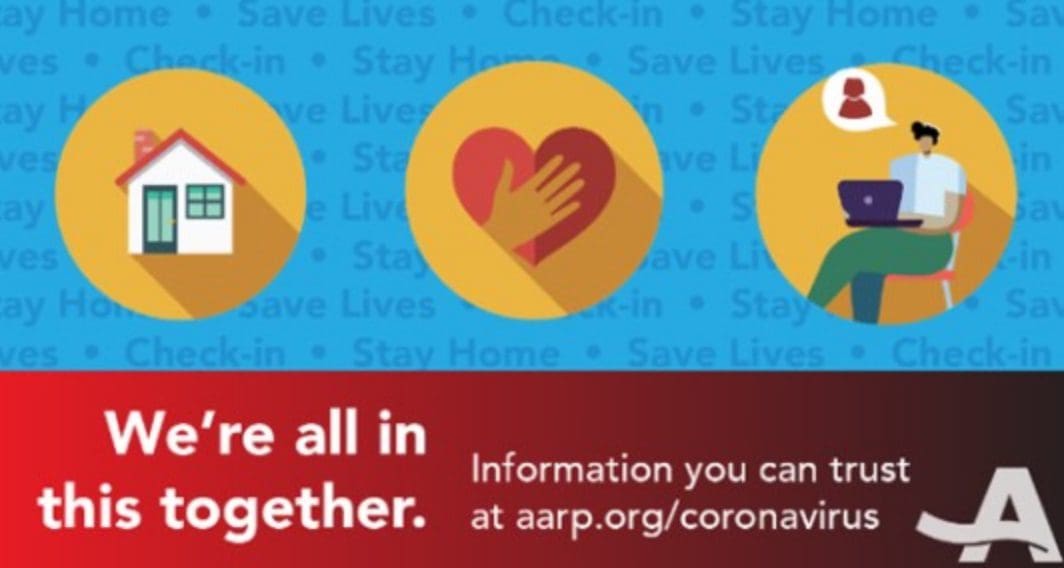Search Posts
Recent Posts
- Vinny Paz to be inducted TODAY into the International Boxing Hall of Fame – CES Boxing June 7, 2025
- In the News… quick recap of the week’s news (6.7.25) June 7, 2025
- Burn with Kearns: Strong without the spend: How scraps became strength tools – Kevin Kearns June 7, 2025
- Rhode Island Weather for June 7, 2025 – Jack Donnelly June 7, 2025
- How to advocate for threatened properties: The Heritage Alliance of Pawtucket June 7, 2025
Categories
Subscribe!
Thanks for subscribing! Please check your email for further instructions.

Tele-Town Hall Gets the Word Out About COVID-19
By Herb Weiss, contributing writer on aging
This week alone, AARP, in some 30 states, conducted tele-town halls and 123 state calls have taken place since the pandemic surfaced. AARP Rhode Island, representing 132,000 members age 50 and over, was among the very first states to address the pandemic in a tele-town hall over two weeks ago.
At the AARP Tele-Town Hall, held Wednesday, April 22, during the 56-minute live event, state officials came to answer questions about how to cope with the devastating COVID-19 pandemic and how seniors can protect their health and stay safe. AARP Rhode Island’s John Martin, Communication Director, served as host and the panel of experts featured Office of Healthy Aging (OHA) Director Rosamaria Amoros Jones and Rhode Island Department of Health Medical Director Jim McDonald. “We had 3,050 participants and, at one time, 974 people were on at the same time,” says Martin, who hosted the call.
“We took 18 live calls in 55 minutes and, unfortunately had close to 20 people waiting to speak when time expired,” he adds, noting that it was AARP Rhode Island’s largest tele-town hall audience ever. According to Martin, “Our in-call interactive poll revealed that nearly three quarters of those who cast votes were most interested in local resources and information on how to prevent the spread of the coronavirus, About a quarter said they were looking for help caring for family and loved ones, and information on insurance.”
Adds AARP State Director Kathleen Connell, “We were extraordinary pleased with the response to the tele-town hall,” who said she expects more statewide calls. “Just as important, however, is our virtual engagement with members and especially our volunteers. We are getting used to communicating online because that is where all of our ‘personal’ contact will be taking place, at least in the next few months — and that will include video conferencing, which we are testing now. We are impressed at how eager people 50 and older are ready to master the technology and join in.”
State Officials Talk COVID-19
“We are at a point where we are starting to see the benefits of our collective efforts of [maintaining] physical distancing, states OHA Director Jones. It is flattening the curb where the peak number of people requiring care at a time is reduced and the health care system is not overwhelmed, she says. “It is really important for us that social or physical distancing as we also refer to it does not equal social isolation,” says Jones, noting that innovative approaches can keep people engaged with each other during this time of physical distancing. Jones also gave a plug for Project Hello (http://oha.ri.gov/get-involved/volunteering/), a program that matches older adults with someone in the community for regular chats and for mutual support. “We’re in it for the long haul and it is going to take all of us working together neighbors helping neighbors,” she says.
“Effective quarantine and isolation efforts are critical today,” says Jones. “Our focus is on making it as easy and as comfortable as possible right now to stay home as we ready ourselves for the new normal that is on the other side of the pandemic,” she adds. Jones called for those in quarantine and self-isolation reach out to Shopping Angels (www.facebook.com/shoppingangelsinc/) for assistance in personal shopping.
One caller expressed strong concern about Governor Gina Raimondo’s comment that people over age 60, at greater risk of severe COVID-19 illness, would be required to stay home for a longer period of time before being allowed to return to work or participate in community activities. “There have been no definitive decisions to implement restrictions at this time,” said Jones trying to reassure the caller.
Although there are programs and services detailed on the internet that can assist older Rhode Islanders to cope with the COVID-19 pandemic, one caller asked how these could be accessed without a laptop, computer or smart phone. Jones noted that The Point (http://oha.ri.gov/get-help/), operated by United Way Rhode Island and linked through 211 or by dialing (401) 462-4444, could provide information, referrals to needed programs and services.
How would people age 60 and over be protected against age discrimination when the governor is stating that it might take a longer time for these individuals to return to work? asked a caller. “It’s something we are thinking a lot about and a lot more [will] come as we talk about what the new normal is going to look like as we come through the peak of the pandemic, says Jones, stressing that age discrimination would not be tolerated.
Jones called for listeners to visit NextDoor.com, a website that promotes volunteer opportunities (including the delivery of groceries for seniors and those in quarantine), to see how they could help those impacted by COVID-19. For those seeking information about housing, Jones recommended a site, RI Havens, that provides a listing of hotels with affordable room rates for front line workers and for those persons stranded because of the virus and might need a safe place to stay. Details about food delivery options and food assistance programs can be found at the site, RI Delivers, that connects those in quarantine or isolation due to COVID-19 with opportunities to have food delivered by local and big-box grocery stores.
One caller asked Dr. James McDonald, Medical Director at RI Department of Health (DOH), about how a person could improve their immunity to assist them to successfully combat COVID-19. “You can’t always control the virus but you can control yourself,” says McDonald, stressing the importance of eating a healthy diet, regularly exercising and losing weight are actions to take to improving your health.
Making COVID-19 Transparent in Rhode Island’s Nursing Homes
During the Tele-Town Hall, McDonald was asked a question, “Why can’t the Health Department provide a list of long-term care and assisted living facilities that will show the number of patients/residents who have tested positive for COVID-19 and the number of facilities.” Twenty-four hours later this list appeared on the DOH Coronavirus Data Hub. (https://ri-department-of-health-covid-19-data-rihealth.hub.arcgis.com/).
McDonald noted that this particular virus has been so effective in causing the pandemic because it takes so long for a person to show symptoms and that other people who have it sometimes spread the virus before they even have symptoms and they don’t even know they should isolate because they don’t feel ill. It becomes important for a person to wear a mask when going outside to stop the spread of the virus, he says.
MacDonald says that it is highly unlikely to catch COVID-19 by touching grocery bags placed on your porch or through picking up a letter or package. He suggests constantly using hand sanitizer and washing your hands before and after picking up items touched by others.
AARP has created a special web page, www.aarp.org/RICOVID for coronavirus information and resources,” says AARP Rhode Island’s Martin added. “There you will find information about our ‘Community Connections’ program, aimed at combating isolation and loneliness, and a direct link to www.aarp.org/coronovirus, where all of AARP’s resources can be found.

Herb Weiss, LRI’12, is a Pawtucket writer covering aging, health care and medical issues. To purchase Taking Charge: Collected Stories on Aging Boldly, a collection of 79 of his weekly commentaries, go to herbweiss.com.
